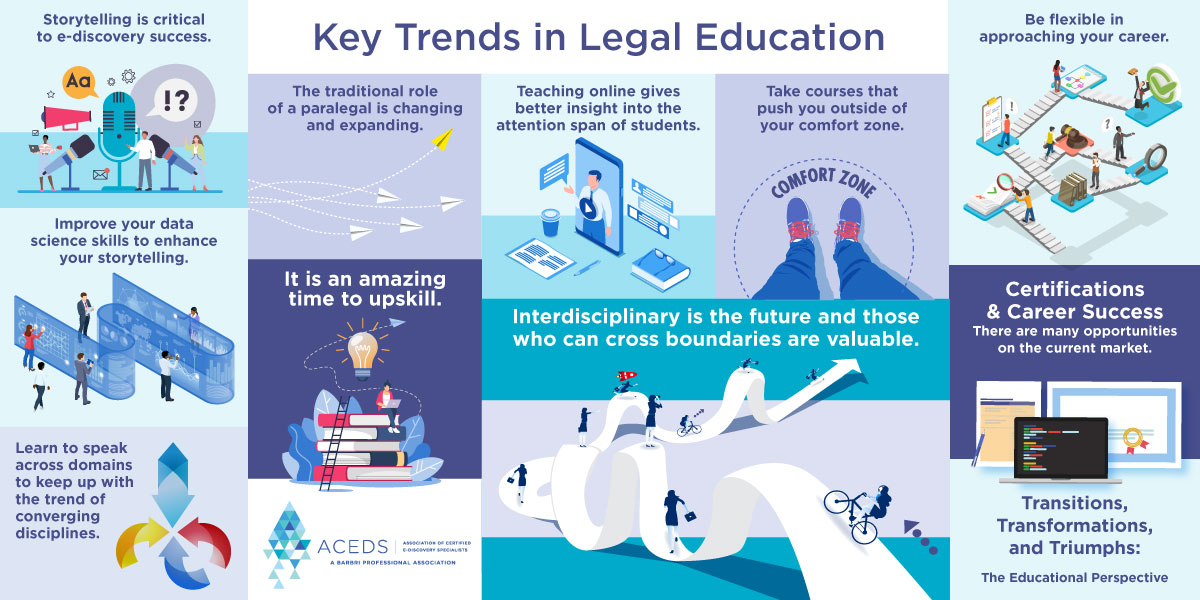The field of education experienced constant challenges, transformations, and opportunities in the last year. Professors and students were thrown into online learning without warning, often needing adjustments to stay afloat and combat obstacles. Though these started as temporary solutions, elements of these changes will become permanent in education and surrounding industries.
ACEDS recently hosted an illuminating roundtable with members of the ACEDS Global Advisory Board serving in education, titled “Transitions, Transformations, and Triumphs: The Educational Perspective” and moderated by Global Advisory Board chair Ari Kaplan and ACEDS President Mike Quartararo. The interactive conversation tackled key trends, lessons from online learning, and fundamental changes that are likely here to stay. Explore the key takeaways and highlights from this conversation below.
To start the roundtable, Kaplan posed the simple question: how have you changed your teaching style in the last year? Maura Grossman, Research Professor at the University of Waterloo, has taken action to provide a more inclusive classroom for students. Grossman has taken race and racial issues into account, expanding her reading list to include more authors that are women, indigenous voices, and other underrepresented groups in the legal industry and beyond. Grossman has also taken mental health strains into consideration, providing students resources and fostering open dialogue.
Bill Hamilton, Senior Legal Skills Professor at the University of Florida, discussed how hybrid classes encourage professors to be more engaging. Teachers had to be creative to ensure students were not merely spectators, both in-person and online. Students are entitled to find class interesting. When asked by Kaplan what will become permanent in the classroom, Hamilton stated that professors must find a way to incorporate an entertainment element in their teaching.
The panel also discussed the importance of storytelling in e-discovery. According to Hamilton, e-discovery is too often viewed as a mechanical process. The goal is to tell the best story for your client, combining data and strategies. To elevate storytelling abilities, first look to improve data science skills.
George Socha, Senior Vice President of Brand Awareness at Reveal, explored the idea that there needs to be a balance in legal education of what TO do and what NOT to do. Lawyers are trained to find a problem more often than finding a solution. Balance is key in all aspects of education, and this should translate to legal education and training.
In an educational setting, examples of both good and bad decisions from cases are taught. What should this ratio look like, and which is a more effective learning tool for students? An audience participant expressed that there is always more interest to talk about cases of uncertainty and mistakes. While these are more memorable, it goes back to the idea of finding problems rather than solutions in legal education. Grossman agreed that you do best when you are passionate about a subject; answers stick better when they are found on their own and come from a place of genuine interest.
An overarching theme of the panel’s discussion is the importance of pushing beyond comfort zones and being flexible in a career, especially at the beginning. The panel encouraged students to take classes purely out of interest and to challenge themselves. Years ago, legal professionals could learn one specialty and practice this for their entire career. Now, it’s essential to remain flexible and open to learning new skills. Mike Quartararo explored the value of legal and professional certifications, and their ability to open new paths in a career. With more flexible work hours and a high demand for multi-talented professionals, it’s a great time to upskill. There are many opportunities on the market for certifications and other legal training programs to expand skills.
“Transitions, Transformations, and Triumphs: The Educational Perspective” was a roundtable in a series of conversations hosted on the ACEDS webinar channel. An infographic of key takeaways from the event was created and can be found here. Visit ACEDS website to stay updated on future educational events and webinars.
Learn more about ACEDS e-discovery training and certification, and subscribe to the ACEDS blog for weekly updates.

